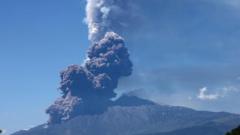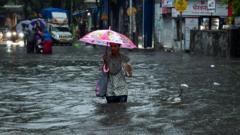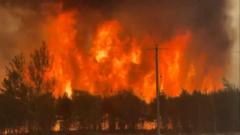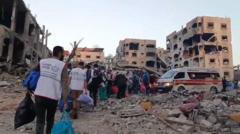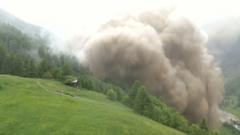With more than 188 wildfires burning across Canada, the provinces of Manitoba and Saskatchewan are experiencing devastating fire conditions, forcing thousands to evacuate. As emergency services and military helicopters work to rescue residents, concerns grow over the potential spread of fires amid worsening weather conditions.
Canadian Provinces Hit Hard by Rapid-Fire Wildfires

Canadian Provinces Hit Hard by Rapid-Fire Wildfires
Over 17,000 residents evacuate as wildfires escalate in Manitoba and Saskatchewan, prompting states of emergency and urgent international assistance.
As wildfires rage across Canada, approximately 17,000 residents have been evacuated from Manitoba due to fast-moving flames. These blazes have prompted a state of emergency in both Manitoba and Saskatchewan, with military aircraft and helicopters deployed to assist in evacuations, especially in remote communities. The ongoing harsh and dry weather is expected to complicate firefighting efforts, with officials noting more than 188 active fires nationwide.
In Saskatchewan alone, 17 wildfires are currently active, many designated as uncontested. Saskatchewan's Premier Scott Moe reported at a Saturday press conference that the number of evacuees, currently estimated at 8,000, could reach 10,000 as the danger continues. "The upcoming days are critical; we need a change in weather patterns and significant rainfall," he emphasized.
Evacuations have particularly intensified in the northern First Nations community of Pukatawagan, with Manitoba officials warning it's a rapidly evolving crisis. Prime Minister Mark Carney acknowledged the immense complexity and significance of the evacuation efforts, praising the determination of the teams in the field.
Currently, in Manitoba, only firefighters and essential personnel remain in Flin Flon, a city of around 5,000. There are a total of 25 active fires in the province, 11 of which are classified as out of control. Manitoba's Premier expressed concerns about the unprecedented simultaneous outbreaks in every region of the province.
Meteorologists from Environment and Climate Change Canada warned that even with an approaching cold front, conditions will remain unfavorable for active firefighting, with winds likely exacerbating fire conditions. Smoke from these fires has reached the United States, issuing air quality alerts affecting an estimated 22 million Americans, including health warnings in northern Minnesota.
The current wildfire season is on track to be one of Canada's worst in history, having already burned over 42 million acres this year alone. While wildfires are natural, experts warn climate change is intensifying conditions that lead to their spread, as prolonged heat and dry weather contribute to dry vegetation and increased fire risks.

